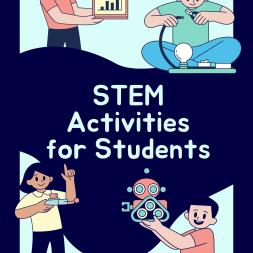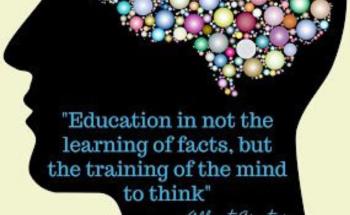
Third-party on-site course
STEM Activities for Students
“STEM Activities for Students: A Professional Development Course for Teachers” is a comprehensive program designed to support teachers in developing and delivering engaging STEM activities to their students.
15.02.2024
Multiple locations
Description
Day 1
- Principles and benefits of STEM education
- Overview of the course and learning outcomes
- Key elements of effective STEM activities
- Designing STEM activities that align with learning objectives
Day 2
- Overview of inquiry-based teaching
- Strategies for implementing inquiry-based teaching in STEM
- Hands-on activity: Designing an inquiry-based STEM lesson plan
- Overview of technology tools for STEM education
- Using educational software and tools in STEM activities
Day 3
- Understanding the importance of diversity, equity, and inclusion in STEM education
- Strategies for promoting diversity and inclusivity in STEM activities
Day 4
- Effective classroom management strategies for STEM activities
- Addressing student misconceptions and managing group dynamics
- Hands-on activity: Role-playing and practicing effective classroom management techniques for STEM activities
- Overview of assessment and evaluation tools for STEM activities
- Measuring student learning outcomes and adjusting teaching practice based on student performance
Day 5
- Collaborating and networking with other STEM educators
- Sharing best practices, resources, and ideas for implementing effective STEM activities
Day 6
- The importance of ongoing professional development and reflective practice in STEM education
- Developing a plan for continuing professional growth and development
- Hands-on activity: Reflecting on personal growth and professional development in STEM education
- The latest trends and developments in STEM education
- Adapting to changes and implementing new ideas and technologies in STEM education
Day 7
- Promoting teamwork and collaboration in STEM activities
- Group dynamics and effective group work strategies
- Hands-on activity: Participating in a STEM activity that requires teamwork and collaboration
- Review of course content and learning outcomes
- Final reflections and feedback
- Course evaluation
Learning objectives
- Understand the principles and benefits of STEM education and how to integrate STEM activities into their classroom curriculum.
- Design and implement effective STEM lessons and activities that align with learning objectives and promote creativity, critical thinking, problem-solving, and teamwork among students.
- Use a range of pedagogical approaches and technologies to support STEM education in their classroom, including inquiry-based teaching, hands-on learning, and educational software and tools.
- Evaluate student learning outcomes and assess the effectiveness of STEM activities in promoting student engagement and achievement.
- Foster a supportive and collaborative learning environment that promotes active participation, sharing of best practices, and constructive feedback among peers.
- Develop and refine their own professional practice as STEM educators and integrate new knowledge and skills into their teaching practice.
- Understand the role of diversity, equity, and inclusion in STEM education and how to design and implement activities that promote diversity and inclusivity in the classroom.
- Develop and apply effective classroom management strategies for STEM activities, including addressing student misconceptions, managing group dynamics, and providing differentiated instruction.
- Identify and use a variety of assessment tools and strategies to measure student learning outcomes and adjust their teaching practice based on student performance.
- Collaborate and network with other STEM educators to share best practices, resources, and ideas for implementing effective STEM activities in their classrooms.
- Understand the importance of ongoing professional development and reflective practice in STEM education, and develop a plan for continuing professional growth and development.
- Gain a deeper understanding of the latest trends and developments in STEM education and how to apply them in their classroom practice.
Methodology & assessment
The “STEM Activities for Students: A Professional Development Course for Teachers” employs a variety of methodologies to support effective learning and engagement among participants.
Firstly, the course is designed to be interactive and hands-on, with a focus on practical activities and exercises that enable teachers to experience and apply STEM education principles in real-world contexts. This approach ensures that teachers have the opportunity to learn by doing and to develop skills through practice and feedback.
Secondly, the course utilizes a range of instructional methods, including lectures, discussions, case studies, and group activities. This approach allows for a diverse and engaging learning experience that accommodates different learning styles and preferences.
Thirdly, the course leverages technology to enhance the learning experience. Participants have access to a variety of digital resources and tools, such as online learning platforms, multimedia materials, and educational software, to support their learning and engagement.
Fourthly, the course is designed to promote collaborative learning and community building among participants. Teachers work in small groups, discuss ideas and challenges, share best practices, and provide feedback to each other throughout the course. This approach fosters a supportive and collaborative learning environment that encourages active participation and engagement.
Finally, the course is designed to be flexible and adaptable to the needs of participants. Teachers can access the course content and resources at their own pace and time, and the course can be tailored to meet the specific needs and contexts of different schools and classrooms.
Firstly, the course is designed to be interactive and hands-on, with a focus on practical activities and exercises that enable teachers to experience and apply STEM education principles in real-world contexts. This approach ensures that teachers have the opportunity to learn by doing and to develop skills through practice and feedback.
Secondly, the course utilizes a range of instructional methods, including lectures, discussions, case studies, and group activities. This approach allows for a diverse and engaging learning experience that accommodates different learning styles and preferences.
Thirdly, the course leverages technology to enhance the learning experience. Participants have access to a variety of digital resources and tools, such as online learning platforms, multimedia materials, and educational software, to support their learning and engagement.
Fourthly, the course is designed to promote collaborative learning and community building among participants. Teachers work in small groups, discuss ideas and challenges, share best practices, and provide feedback to each other throughout the course. This approach fosters a supportive and collaborative learning environment that encourages active participation and engagement.
Finally, the course is designed to be flexible and adaptable to the needs of participants. Teachers can access the course content and resources at their own pace and time, and the course can be tailored to meet the specific needs and contexts of different schools and classrooms.
Certification details
- Certificate of Attendance
- Europass Certificate (if requested)
Pricing, packages and other information
-
Price:560Euro
Additional information
-
Language:English
-
Target audience ISCED:Primary education (ISCED 1)Lower secondary education (ISCED 2)Upper secondary education (ISCED 3)
-
Target audience type:TeacherHead Teacher / PrincipalNot-for-profit / NGO staff
-
Learning time:25 hours or more
Past sessions
More courses by this organiser

On-site
Digital Education and Artificial Intelligence Key Tools for Future Learning
Multiple locations
Organised by

On-site
Innovations In Mentorship & Coaching Dynamics In A Digital World
Next upcoming session
-
Multiple locations
Organised by

On-site
Creative, Critical, And Lateral Thinking For Inclusion
Next upcoming session
-
Multiple locations
Organised by


